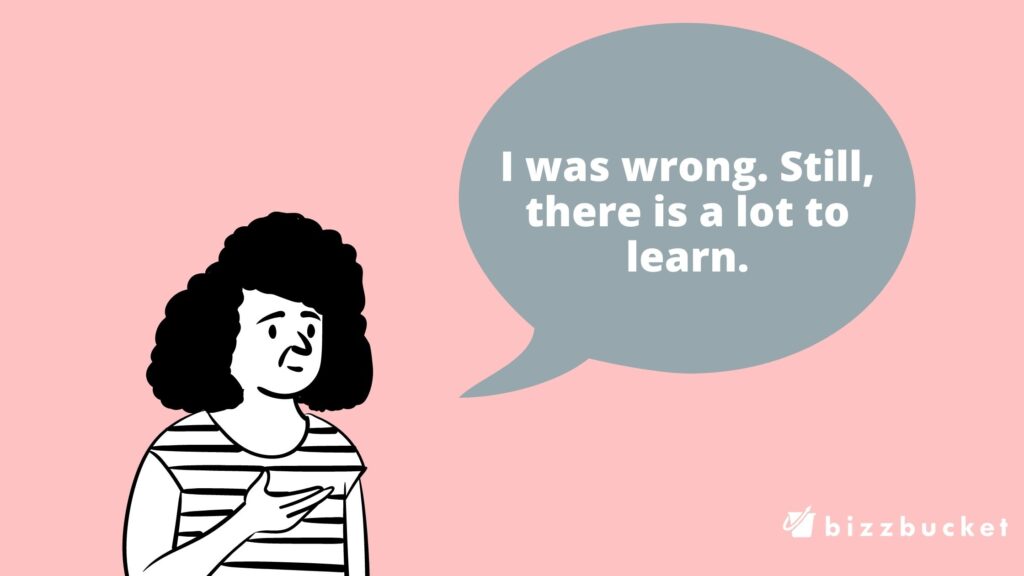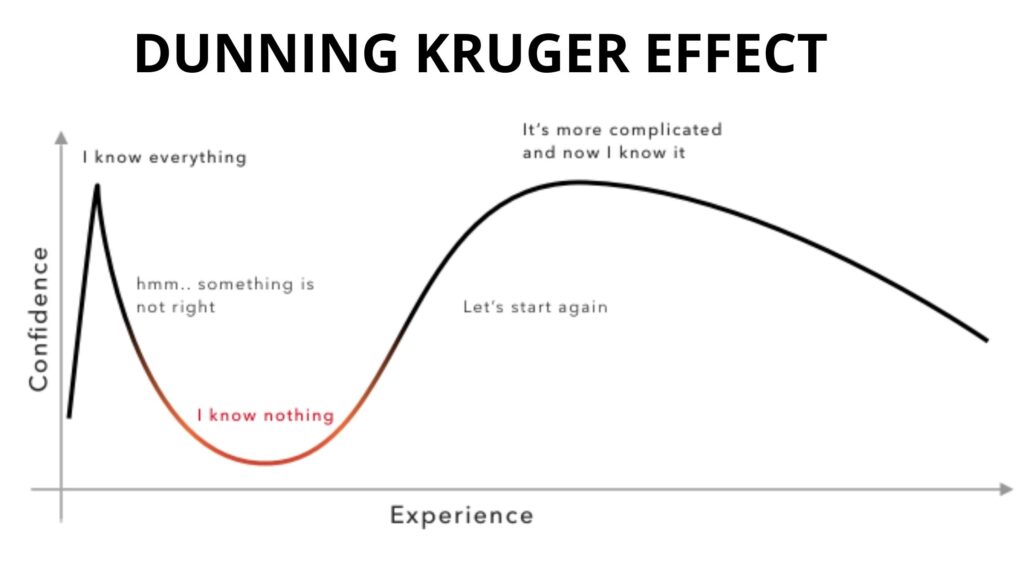“A little knowledge is a dangerous thing,” let me tell you how.
Suppose you and your sibling decide to learn a new language; you start separately at your own pace. After a few days, you are able to say 30-40 words, yet you can only construct a few sentences. You may feel a bit unsatisfied with your progress.
However, on the other hand, your sibling has learned 10-15 words and is very proud of his progress. However, your sibling is neither pronouncing the word correctly nor constructing grammatically correct sentences.
Even though your sibling has learned the least, their lack of knowledge prevents them from understanding their own mistakes. Additionally, their inability to compare performance causes them to overestimate their relative ability.
Your sibling’s ignorance makes them think thatchy are excelling when in reality, they are learning at below-average speed. In this case, your sibling’s language skills are lacking. They are clueless about it, and on the contrary, they are confident of their achievement. This is the Dunning-Kruger Effect in action.

Index:
What is the Dunning-Kruger effect?
The Dunning-Kruger effect is a cognitive bias. The bias occurs when a person with limited knowledge, competence, or skills in a specific area, intellectual or social domain, overestimates their competence. They overestimate their skills in comparison to the objective criteria or performance of their peers in general.
This effect also makes people who excel in a specific skill think that a particular task is easy and underestimate their relative ability.
As far as businesses are concerned, the Dunning-Kruger effect is in action when businesses and business owners do not have the necessary expertise and skills in a specific field and make bad decisions. Moreover, their lack of knowledge prevents them from perceiving and understanding their mistakes.
Understanding the Dunning Kruger effect:
According to psychologists Justin Kruger and David Dunning at Cornell University, who came up with the effect explained, the metacognitive ability of a person that helps recognize deficiencies in their competence requires that such a person possess a minimum level of such knowledge or skill, which other who show the effect have not attained.

The researchers David Dunning and Justin Kruger noticed how people often overestimate their abilities. They also coined the term “dual burden” to describe that such people suffer from two things:
- Ignorance, and
- Ignorance of ignorance.
The Dunning-Kruger effect was coined in 1999, and it stated that the limits of a person’s ignorance are often unknown to them. Especially in areas where they are underqualified. It is this ignorance of ignorance that leads to an individual overestimate their abilities and skills.
Such a person may similarly believe that their abilities are superior to others. At the same time, a skilled person with sufficient knowledge in a field will always assume that there is much more to learn and understand. However, an ignorant person will acknowledge their inability when they receive awareness about facts and skills through education.
Causes of the Dunning-Kruger Effect:
So what explains this effect?
The researchers suggest that people are not just incompetent, but their incompetence robs them of the ability to realize it. The reading causes for the same are:
- The inability of a person to recognize and acknowledge their lack of knowledge and mistakes.
- Lack of ability to step back and reflect on their skills and skills from outside of themselves. This limited perspective makes them think they are highly skilled and superior to others. Additionally, it can lead to knowledgeable people ignoring the inability of others.
- Other factors that contribute to the effect include heuristics and loss aversion.
Why understanding the Dunning-Kruger effect is important?
Understanding the Dunning-Kruger effect is essential as it makes people aware of their blind spots and knowledge gaps and offers an opportunity to reflect on our self-perceptions. Since the effect is invisible to people experiencing it, it requires a person to take a step back and understand that their self-assessments are biased and incorrect.
The effect is a Catch 22 situation. People don’t know about a subject and don’t have the knowledge to spot their mistakes. Because of their blind spots, they cannot understand where they are going wrong, and they assume they’re doing well.
On the contrary, people at the top of their skills in a specific area do not notice their specialty or the fact that such knowledge and ability aren’t available to everyone. The ease blinds them to the fact that the same work can be more challenging for the rest. So, instead of underestimating their skills, they overestimate everyone else’s abilities.
So, if you are making a decision based on your skills and have not consulted professionals, you are likely to make a wrong decision. And on the other hand, if you are taking a professional’s word on something they are good at, your judgment is skewed as they might be grossly overestimating their performance.
How does the Dunning-Kruger effect impact business?
- The Dunning-Kruger effect affects businesses. This effect is mainly seen when a new product or service is being introduced in the market. People might come up with new products and services keeping in mind the latest or upcoming advancements but are not equipped with the requisite knowledge and resources to sustain the product or service in the long run.
For example, multiple new entrepreneurial ventures rapidly transformed their payment mechanisms due to the digitalization of money and the arrival of bitcoin; however, if they do not have the right people, knowledge, resources, and technology, their mistake can leave a lasting impact on their viability.
- Overconfidence can affect businesses as it makes them unwilling to appreciate and take sound advice from reputed professionals. This is damaging as it can lead to bad decisions. An example of such behavior can be seen in new businesses and startups when businesses do not take advice from legal, financial, and tax experts. They think that it is a waste of time or unnecessary wastage of money. However, without their help, you may face legal and financial losses in the future.
How often do you come across a successful business entity that does not take the services of legal, financial, and tax experts? Never. Legal advice, financial planning, and account maintenance are services that new businesses tend to save money on as they believe they have the required skills and don’t need experts. However, the consequences of these are often disastrous.
Why battling the Dunning-Kruger effect is important, how to address it?
The Dunning-Kruger effect causes us to listen to people who speak first and loudest rather than people with reputations. This has a negative impact, as we accept advice from people who speak first rather than those whose words hold merit.
Also, acknowledging the Dunning-Kruger effect may ease your insecurity toward rivals who seem to have it all together. Thinking that a person knows everything is a mark that such a person knows very little. Since businesses are often ignorant of the effect, it is advisable to pause and reflect. The following points may help address the impact before it inflicts damage.
- Evaluate all significant decisions and decision-making processes critically. How do things usually happen, how are decisions made? Is there a better and more economical and efficient way? Would a change yield benefits?
- Evaluate and understand the workplace culture. Managers should be able to assess what kind of leadership are the employees looking for? Is the current scenario helping employees be productive? Are they in a position to offer their best to the business?
- Evaluate your relationship with your customers. Think from the customer perspective and see you are doing enough to maintain your customer base? Can you offer them something more?
A final word:
Ultimately, humility, critical thinking, and reflection can help an individual or business overcome bias. Business owners need to understand that they don’t need to know everything and accept it.
All successful business owners acknowledge that it is vital to employ the wisdom, critical understanding, and advice of professionals. Recognizing areas where a business needs improvement, and the skills of professionals can lead to a more prosperous and sustainable business in the long run.
Do Share Your Thoughts:
Do tell us all your thoughts in the comments section below, we look forward to reading all the comments in the section below.
Also, do check useful Startup Resources and Tools below and join our newsletter 📰 for free for more interesting Business Case Studies 💰, Startup Insights 🚀, and Startup founders podcast 🎙️ delivered to your inbox every Sunday morning.
Related Articles:
- What is the Availability Heuristic and how does it impact your business?
- What is a Representative heuristic and how does it impact your business?
- Status Quo Bias: How it impacts your business?
- What is Sunk Cost Fallacy and how does it impact your business?
- Disposition effect: Why it matters in business?
- Licensing effect: How it impact businesses?
- Halo effect: Why it matters in business?
- Fundamental Attribution Error: Why it matters in business?
What is Dunning Kruger Effect?
The Dunning-Kruger effect is a cognitive bias. The bias occurs when a person with limited knowledge, competence, or skills in a specific area, intellectual or social domain, overestimates their competence.
Whats the example of Dunning Kruger Effect?
The Dunning-Kruger effect causes us to listen to people who speak first and loudest rather than people with reputations. This has a negative impact, as we accept advice from people who speak first rather than those whose words hold merit.